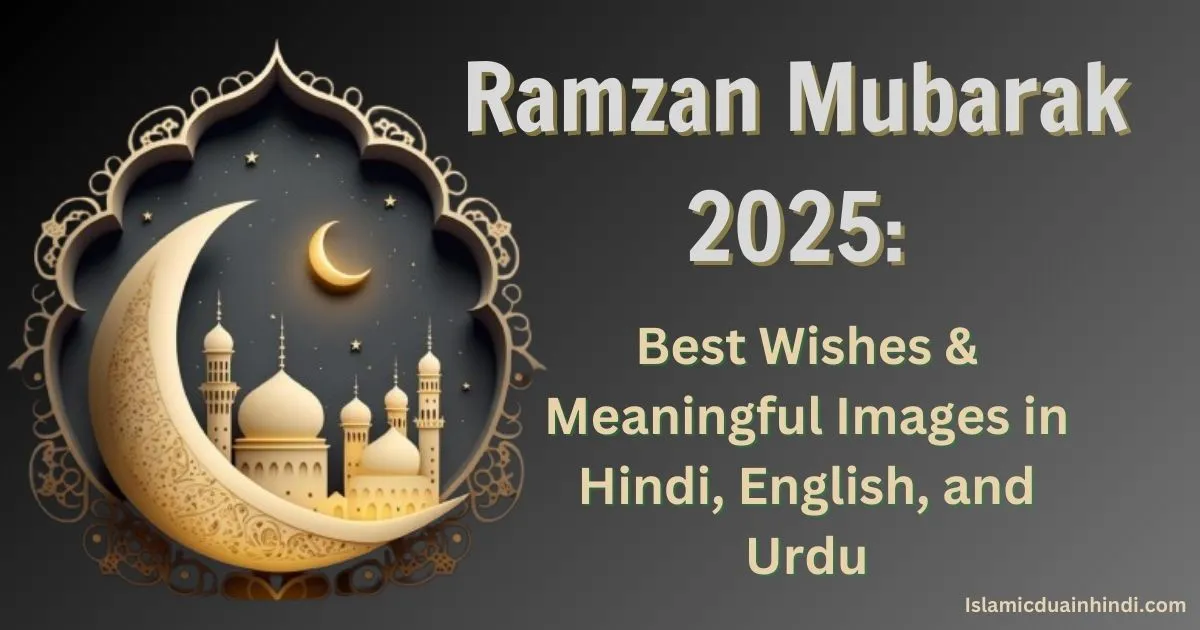Roza kholne ki dua with translation padhna chahte ho? read this post.
Ramadan is a sacred month for Muslims, and fasting during this time is one of the Five Pillars of Islam. Throughout the month, Muslims fast from dawn till sunset, abstaining from food, drink, and other physical needs. The moment when the fast is broken—known as Iftar—is an important and spiritual event. As the day of fasting concludes, Muslims recite the “Roza Kholne Ki Dua” to express their gratitude, acknowledge Allah’s blessings, and seek His mercy.
In this blog, we will discuss the “Roza Kholne Ki Dua” and provide its translations in Hindi, Urdu, and English, supported by Islamic references. This dua is often recited at Iftar time to ensure the fast is accepted and to invoke Allah’s blessings.
You may also like:
roza rakhne ki dua with translation & best images for Sehri
Roza Kholne Ki Dua
Roza Kholne Ki Dua: Arabic Text
Arabic:
اَللّٰهُمَّ إِنِّي لَكَ صُمْتُ وَبِكَ آمَنْتُ وَعَلَيْكَ تَوَكَّلتُ وَعَلَى رِزْقِكَ أَفْطَرْتُ فَتَقَبَّلْ مِنِّي
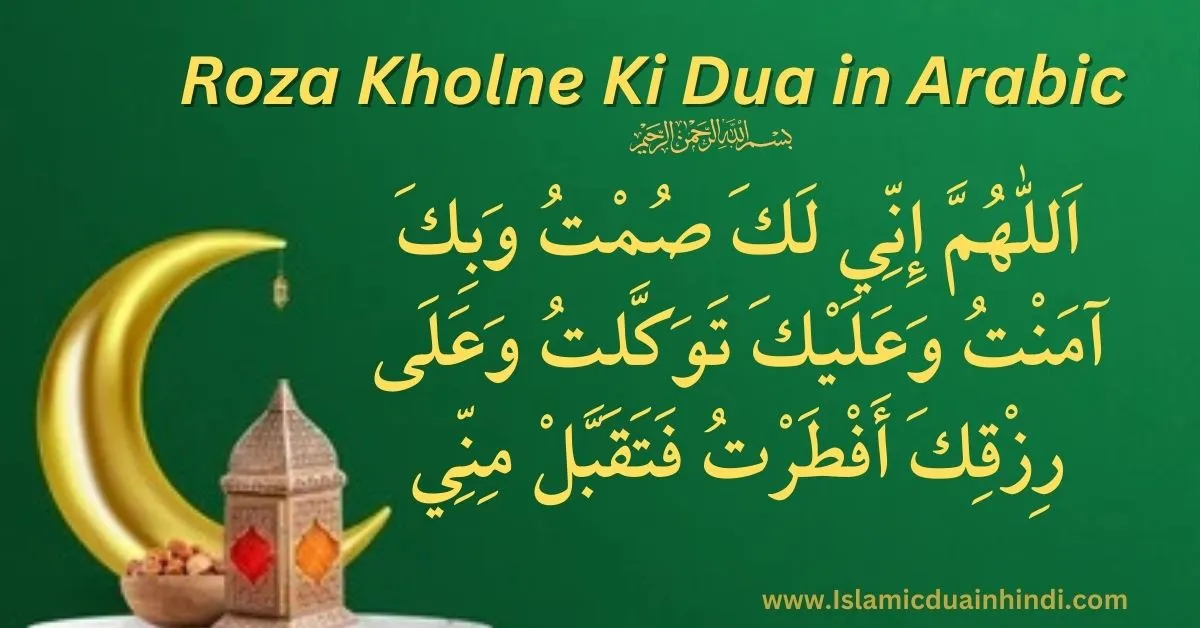
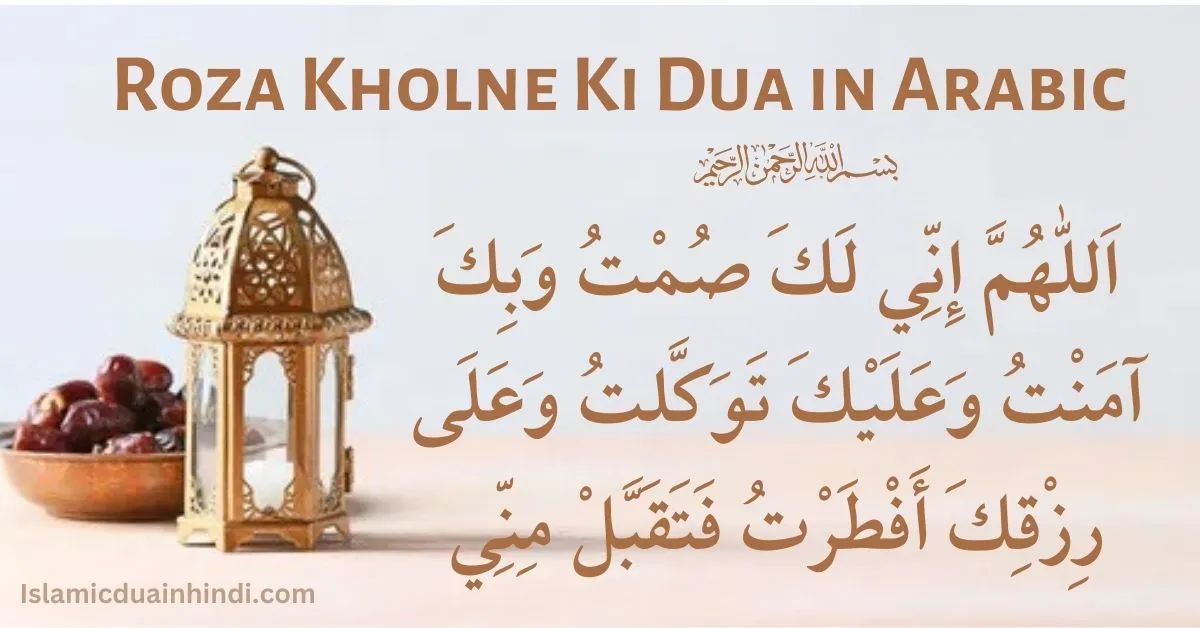
Transliteration: Allahumma inni laka sumtu wa bika aamantu wa alayka tawakkaltu wa ‘ala rizqika aftartu fataqabbal minni.
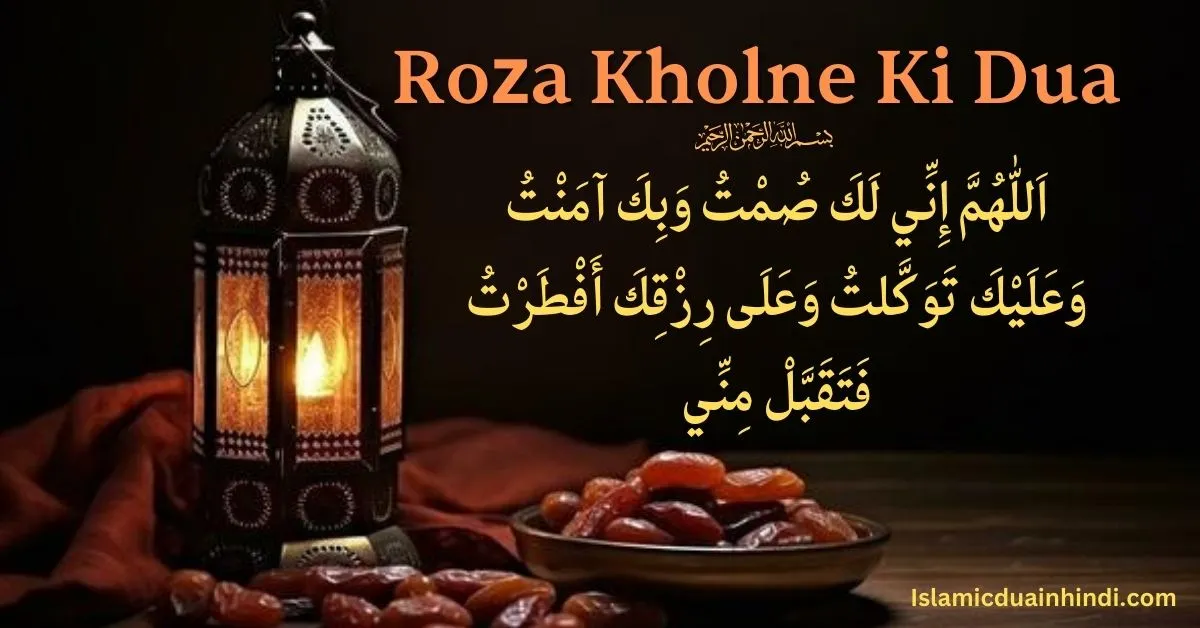
roza kholne ki dua in hindi
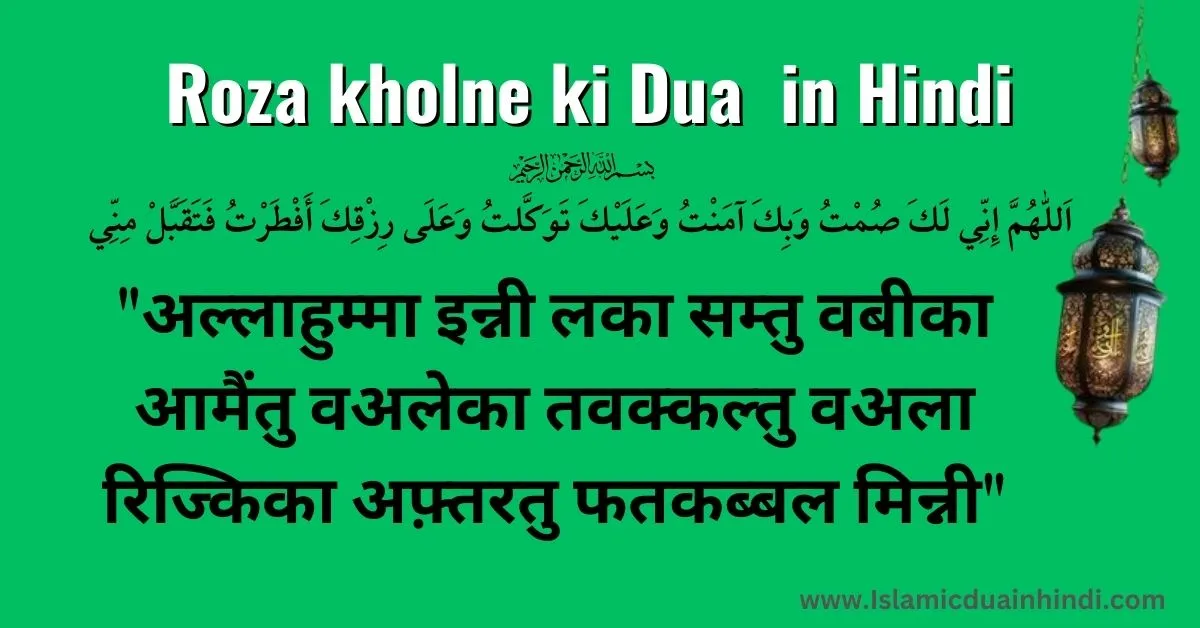
roza kholne ki dua hindi Translation:
- Hindi Translation: “”हे अल्लाह! मैंने तेरे लिए रोज़ा रखा, तुझ पर विश्वास किया, तुझ पर ही भरोसा किया, और तेरे आशीर्वाद से अपना रोज़ा खोला। तो कृपया इसे मुझसे स्वीकार कर ले।”
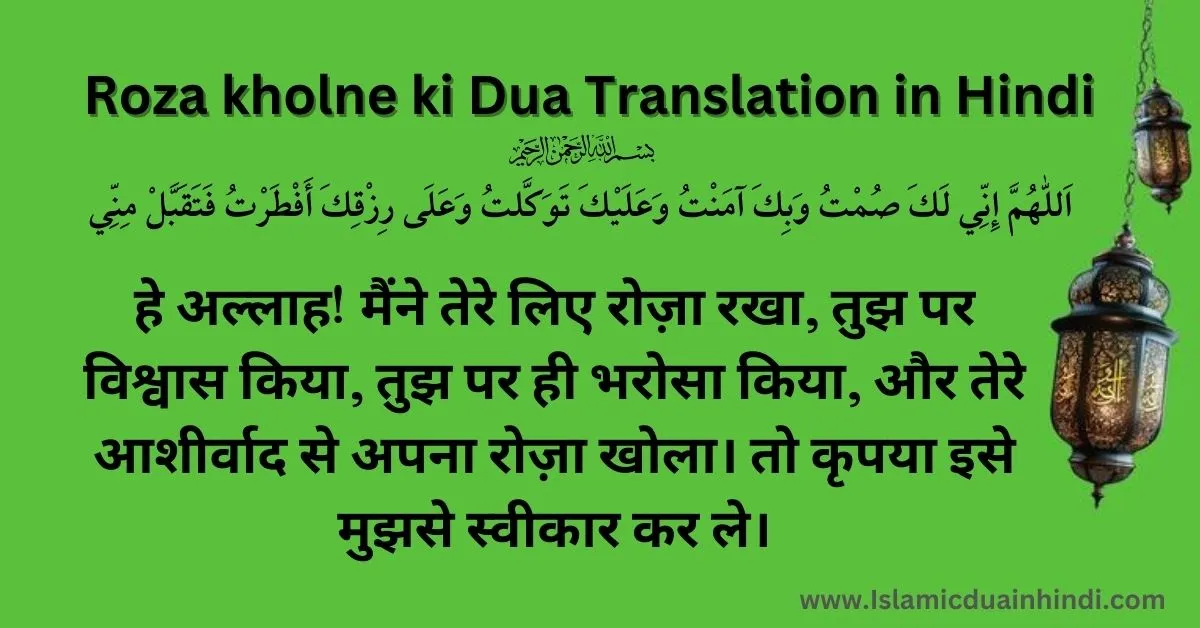
roza kholne ki dua in urdu:
- Urdu Translation:“اے اللہ! میں نے تیرے لئے روزہ رکھا، تجھ پر ایمان لایا، تجھ پر بھروسہ کیا اور تیرے رزق سے افطار کیا۔ تو اسے مجھ سے قبول فرما لے۔”
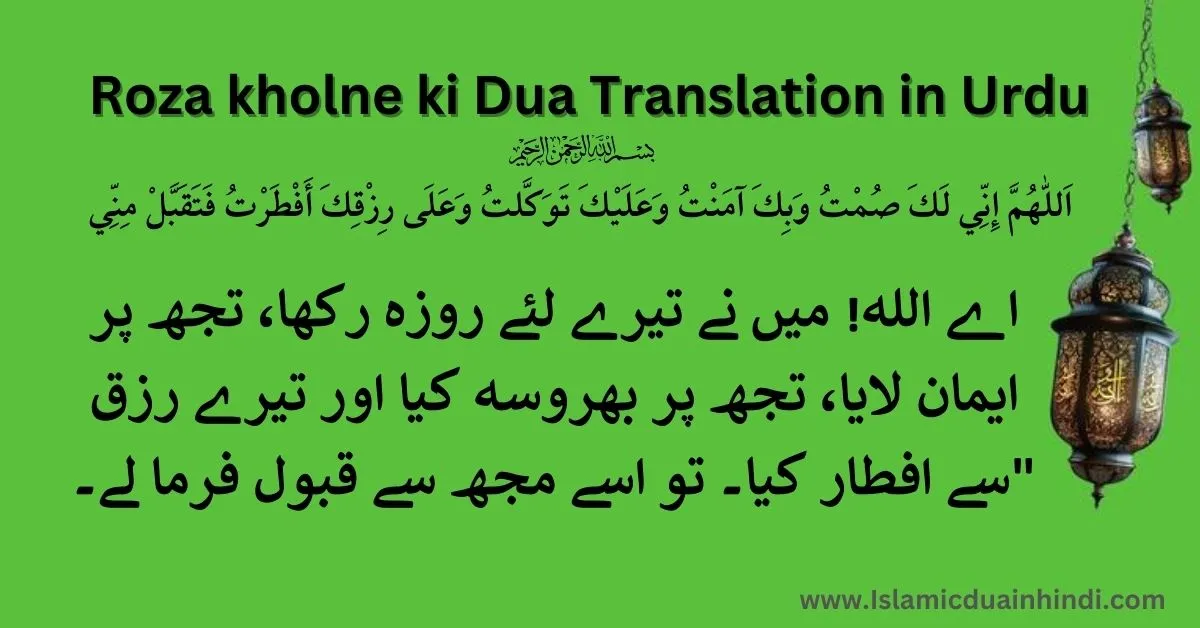
roza kholne ki dua in english
Allahumma inni laka sumtu wa bika aamantu wa alayka tawakkaltu wa ‘ala rizqika aftartu fataqabbal minni.
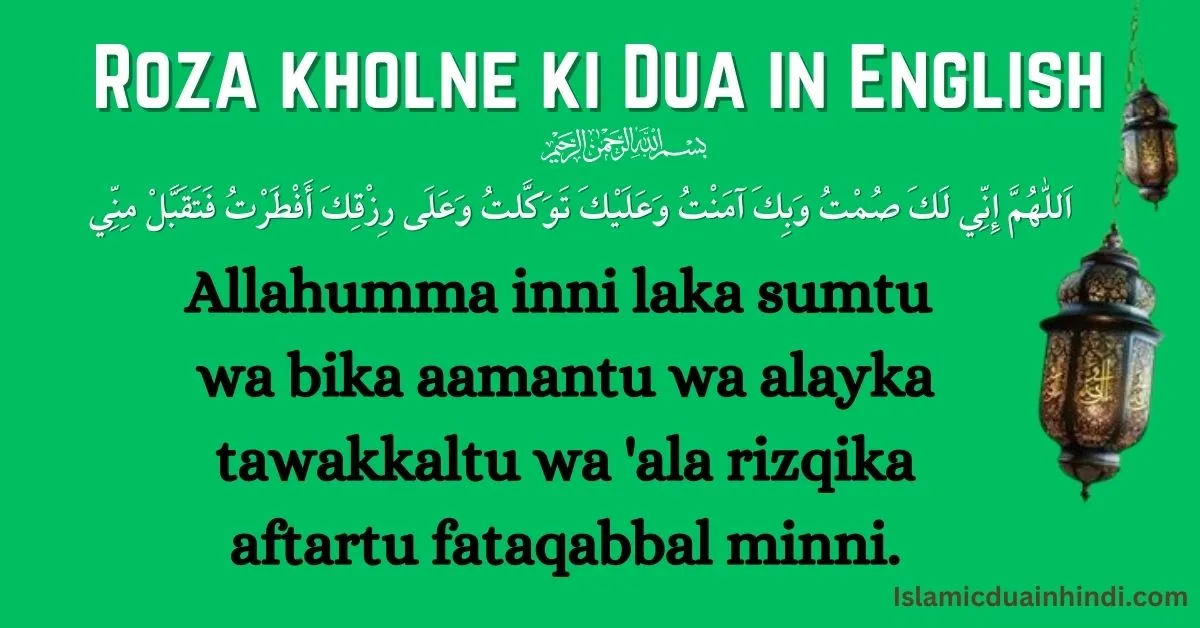
roza kholne ki dua Translation in English
- English Translation: “O Allah, I have fasted for You, and I have believed in You, and I have put my trust in You, and with Your sustenance, I break my fast. So accept it from me.”
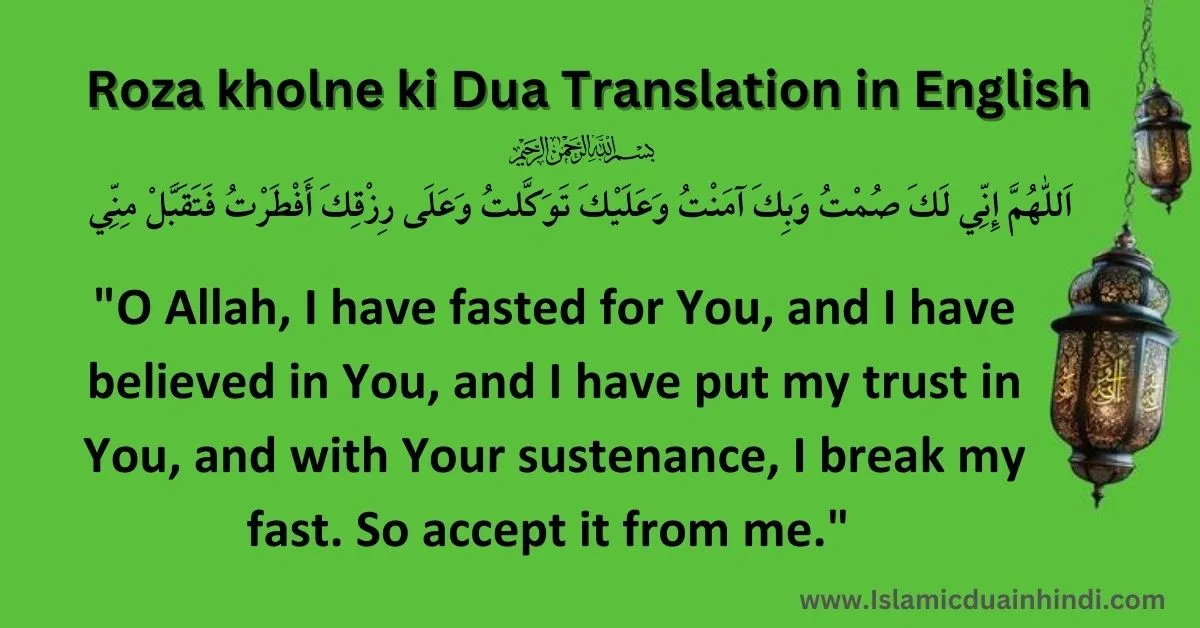
you may also like:
“Ramzan Mubarak 2025: Best Wishes & Meaningful Images in Hindi, English, and Urdu
Significance of Roza Kholne Ki Dua:
The “Roza Kholne Ki Dua” is recited at the moment of breaking the fast (Iftar), and it is a moment of deep spirituality and reflection. This dua encapsulates the core beliefs and practices of fasting in Islam and reminds us of the following key points:
1. Fasting for the Sake of Allah:
The opening phrase “اللهم إني لك صمت” (O Allah, I fasted for You) signifies that fasting is an act done solely for Allah’s pleasure. Fasting during Ramadan is not just a physical act of abstaining from food and drink, but a spiritual endeavor to gain closeness to Allah.
2. Belief in Allah:
“وبك آمنت” (And I believe in You) emphasizes the deep faith a Muslim has in Allah. The fast is not merely an outward practice but an inner commitment to Allah and His commands. Belief in Allah is foundational to every aspect of a Muslim’s life.
3. Trust in Allah’s Will:
“وعليك توكلت” (And I place my trust in You) acknowledges that all actions, including fasting, are ultimately under the control of Allah. Fasting teaches patience, discipline, and reliance on Allah’s will, knowing that He is the source of all strength and sustenance.
4. Gratitude for Allah’s Sustenance:
“وعلى رزقك أفطرت” (And with Your sustenance, I break my fast) reflects a profound recognition that all sustenance—food, water, and every blessing—is from Allah. By acknowledging Allah as the provider, we remain humble and grateful for the countless blessings He bestows upon us.
Islamic References and Hadiths About Iftar and Dua:
The significance of Iftar and making du’a at this time is well-supported by authentic Islamic references. The following hadith highlights the importance of making supplications when breaking the fast:
Hadith from Sahih al-Bukhari: “When one of you breaks his fast, he should say: ‘The thirst has gone, the veins are moistened, and the reward is confirmed, if Allah wills.'”
(Sahih al-Bukhari)
This hadith reminds us that the moment of Iftar is not just a time to eat and drink, but also a time to reflect and make supplications. The act of breaking the fast with the intention to gain Allah’s mercy is considered a highly rewarding practice.
Additionally, the Prophet Muhammad (PBUH) recommended specific supplications to recite when breaking the fast:
Hadith from Sunan Abu Dawood: “The fasting person has a supplication that will not be rejected when he breaks his fast.”
(Sunan Abu Dawood)
This hadith emphasizes the power of du’a at Iftar, highlighting that the time of breaking the fast is an opportunity for supplications to be accepted by Allah.
The Sunnah of Breaking the Fast (Iftar):
The Prophet Muhammad (PBUH) set the perfect example for us in every aspect of life, including breaking the fast. He recommended breaking the fast with dates, and if dates were unavailable, then with water:
Hadith from Sunan Abu Dawood: “When the Prophet (PBUH) would break his fast, he would break it with dates, and if there were no dates, he would break it with a few sips of water.”
(Sunan Abu Dawood)
This Sunnah shows the simplicity of the practice of Iftar. It is a reminder to be grateful for even the simplest sustenance provided by Allah.
The Spiritual Importance of Roza Kholne Ki Dua:
The “Roza Kholne Ki Dua” serves as a reminder of the essence of fasting—gratitude, faith, and trust in Allah. By reciting this dua, the fasting person acknowledges that every moment, every drop of sustenance, and every act of worship is a blessing from Allah.
Fasting during Ramadan is not just about abstaining from food and drink; it is about cleansing the soul, purifying the heart, and strengthening the connection with Allah. The “Roza Kholne Ki Dua” reinforces these values, and it is an opportunity to renew one’s commitment to Allah’s commands and seek His forgiveness.
Why Should You Recite the Roza Kholne Ki Dua?
- Express Gratitude to Allah: Reciting this dua is an act of gratitude, as it reminds us that everything we have is a gift from Allah. When we break our fast, we acknowledge that the sustenance provided to us comes from His mercy.
- Strengthening Faith and Trust: By saying “وبك آمنت” (And I believe in You) and “وعليك توكلت” (And I place my trust in You), this dua strengthens our faith and trust in Allah’s plan for us.
- A Moment of Reflection: As we break our fast, this dua encourages us to pause and reflect on the blessings of Ramadan and the ability to complete another day of fasting. It is a time to pray for acceptance and forgiveness.
- Enhancing the Spiritual Experience of Iftar: Iftar is a sacred time, and reciting this dua enhances the spiritual experience of breaking the fast. It is not just about the food we consume, but about the act of devotion and worship.
roza rakhne ki dua with translation & best images for Sehri
Conclusion:
The “Roza Kholne Ki Dua” is a beautiful supplication that connects us with Allah during the moment of Iftar. It serves as a reminder that fasting is an act of devotion, that sustenance comes from Allah, and that our trust and faith should always be placed in Him.
By reciting this dua, we acknowledge the mercy of Allah and express our gratitude for the strength to complete our fast. It is a reminder that every blessing, including the food we eat, is a gift from Allah.
May Allah accept all of our fasts, forgive our sins, and grant us His mercy and blessings. Let us strive to break our fast with gratitude, reflection, and devotion, as we continue to strengthen our connection with Allah throughout the holy month of Ramadan.
for more visit to our website Islamicduainhindi.com
you may like:



